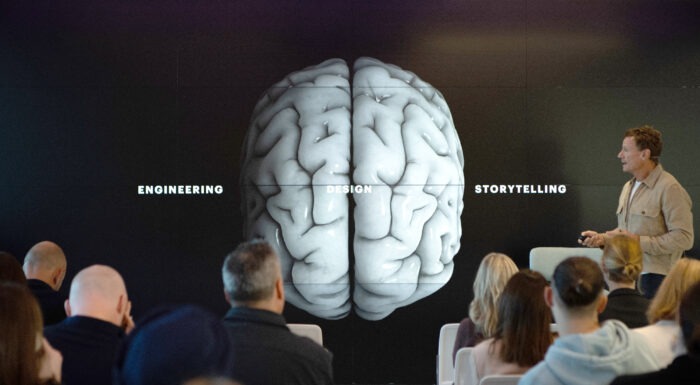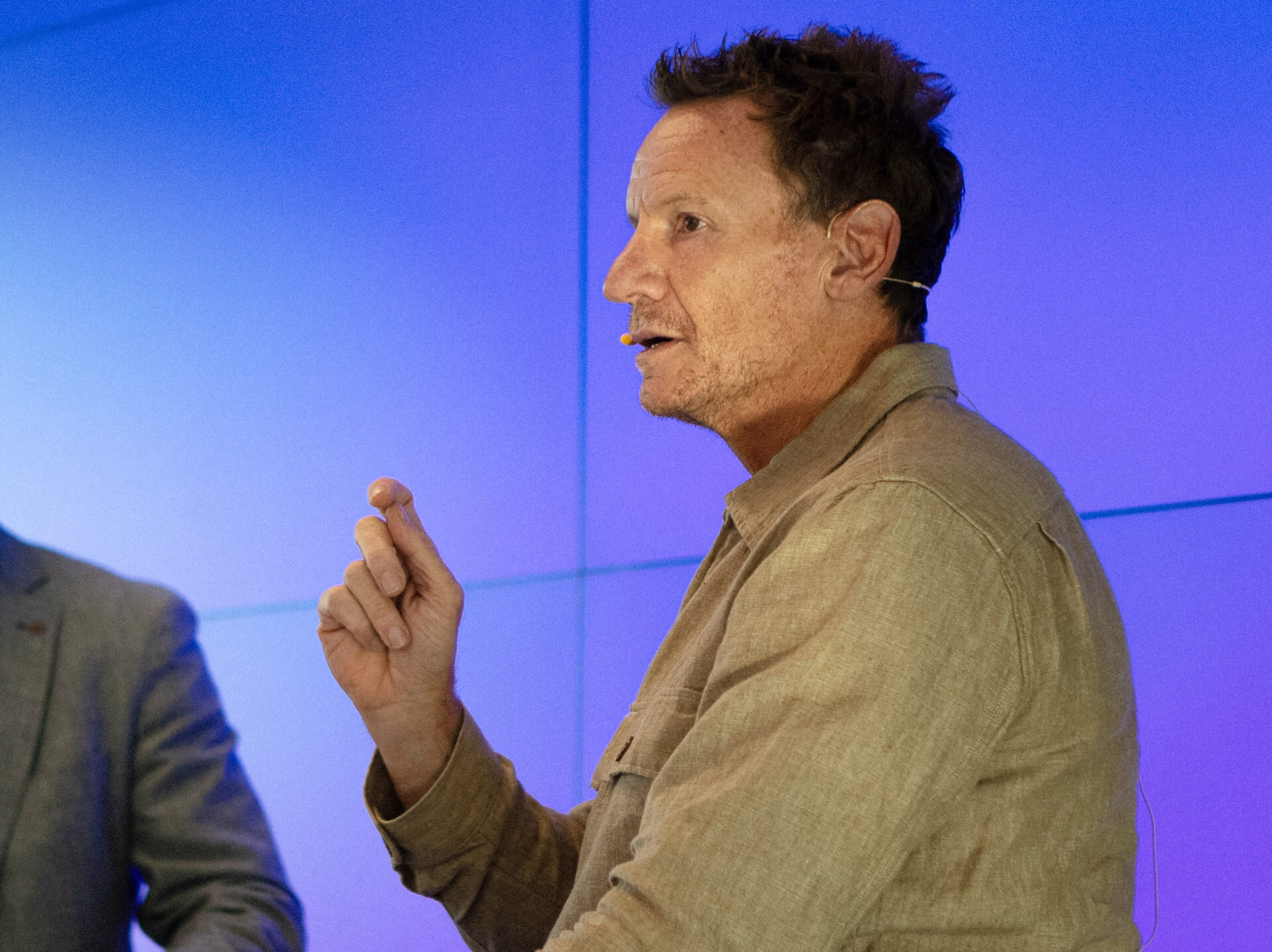The story goes that when the Lumière brothers showed their footage of a train arriving at a station to the public in the late 1890s, people scrambled to get out of the way, frightened by the film’s realism into thinking that they were at risk of being hit.
Nick Law is not afraid of being hit by new technology, quite the opposite.
In the age of AI, “mediocre is going to be for free” said Law, who played the 120-year-old Lumière film as part of a presentation to a packed audience in The Dock, Accenture’s innovation centre on Hanover Quay.
“I’m petrified of being boring… There’s so much fear in the corporate environment right now, and I think what we should be most scared of is being boring, especially in this industry.”
Law, appointed global creative chair of Accenture Song in February 2022, has spent his 30-year marketing career adapting creativity to cutting-edge technology.
After years at advertising firm R/GA, he moved to the Publicis Groupe, before becoming a vice president of marketing communications at Apple in 2019. Former clients include Nike, Samsung, HBO, IBM and Google and his accolades include five Cannes Lion Grand Prix.
In a loose linen bomber jacket and trousers, the Australian cut a relaxed and self-confident figure as he spoke about how to be creative in the age of AI. It was organised by Accenture Song, in collaboration with the Marketing Society of Ireland, with The Currency as a media partner.
“I actually believe that the moral panic and the optimism around generative AI is warranted; I think that it is a paradigm shift,” he said. “It’s going to be ubiquitous”.
Here are four of his insights that creative industries can use to weather that shift.
Creatives need to develop an ‘AI grammar’
“Big ideas that somehow float above execution are a lie,” Law said. “It’s actually impossible to be creative without technology, because creativity is the act of taking something in your brain, an idea, and creating something.”
It’s at this point during the event he showed the Lumière film. Compared to the AI-generated fever dreams that he showed later, this seminal piece of film history is dull.
“At the beginning of new technology, the practitioners of that technology, so the first people to actually express it creatively are technicians,” he said. The first photographers were less versed in composition than chemistry, the first expressions of creativity in generative AI have come from engineers.
“Right at the beginning of film, it was a fixed camera and there was no editing… They hadn’t even imagined what it would be like to edit, to move the camera.”
Then a creative grammar that “had nothing to do with the technical triumph of actually putting a moving image on a wall” developed around film: cutting it and sequencing it to tell a story.
This opportunity exists today for marketers wanting to make their mark with generative AI: “That’s why it’s exciting,” said Law, “you can actually invent a grammar.”
“Creativity needs technology and vice versa,” he said. “I think this is particularly true in the advertising industry, and it’s often forgotten.”
Creatives can’t be technology agnostic
Law told the audience that he had spent a lot of his career trying to convince creative people, scared of technology, that the technology wasn’t the problem, the problem was their own lack of familiarity.
“We’re not agnostic about using the technologies we’re fluent in,” he said. “We actually quite enjoy it; I’m not agnostic about using a washing machine.”
Law said that a company leadership trying to get its staff onboard with a new technology should look at structure and culture. “The [structural] incentives and the way that you connect people should be trying to promote the very thing you’re trying to do,” said Law.
“The cultural piece is your willingness to work with other people and not to be scared.”
It’s easier for start-ups where everyone has bought into a strong mission, he said. For “bigger companies at scale, you need to make people understand you’re going to be better and more famous and richer and better for your next job if you do this”.
In answer to a question about how a company should choose which platforms and technologies to invest time in, Law, unfortunately, didn’t have an easy answer: “You need to be across enough things to understand how things combine,” he said. “If you want to be an agency, and not a production company… and have an opinion about the technology, you need to connect a few nodes.”
And because consumers flit from platform to platform, “your ability to combine those things will put you in a better position to not just do great work, but advise clients on what sort of work they should do”.
The other option is to specialise in one platform but “you probably have the lifespan of a mayfly, because these things churn so quickly now,” Law added.
Choose the right creative for the job
Law believes that creators are on a spectrum from inventive to expressive – and that a successful company needs to meld both.
The skill sets are different, though, and unless you’re a polymath, Law advises employers and employees to know where people excel. He used to get frustrated when experienced website designers would try to move into narrative marketing… “and they just weren’t very good at it”.
“There are two species of creativity,” he said. “Inventive, which is making amazing things out of nothing, and there’s expressive, which is so how do you take a medium and touch people.” He likened this to the difference between the sciences and humanities.

“The most important and successful consumer product the world’s ever seen was a result of bringing those two tribes together,” said Law.
He meant the iPhone.
“Jobs would famously talk about Apple being the intersection of science and humanity – he would say that all the time – and the best expression of that was the combination of hardware and software.” Managing to do this successfully is what set Apple apart, according to Law.
This is going to become more important in an age of AI as experience and expedience will need to be balanced, he believes.
Creatives take heart: human experience is still needed
“If I were to characterise [AI] I would say it’s all about combining things,” said Law. “If the Industrial Revolution was about making everything, the Internet revolution was about connecting everything. This is about combining everything.”
This, said Law, holds a promise of efficiency, “but we don’t want that at the expense of humanity”.
“I landed on a way to describe, from a creative perspective, how to approach this technology, and that is: take friction away from the mundane, add texture to the humane,” he explained.
Human-led design will bridge the gap between AI technology and the person using the result of whatever that technology has enabled companies to produce. It will be through good design that the complexities of consumer products and systems will be reduced and transformed into a narrative.
Put another way: “The difference between my synthesising of the information and that of a large language model is that my hallucinations are particularly human,” Law said.
“There’s always going to be a drag on technical change based on culture’s ability to consume it and to understand it,” he said. “So understanding humans will always be more important, in the context of technology.”
However, Law ended on a note of caution for his industry: to guard the human creative element carefully and value it appropriately. “The biggest mistake that this industry has made is to give creative away as a loss leader for media,” he said and compared the situation to the early internet days when news companies gave their online content away for free in order to grow their offline brands.
Now, he said, “the holding companies are giving away the one thing that’s valuable and defensible in the future, which is human creativity, for the one thing that’s going to be so automised [that] it’s going to go away completely.”
He called it “the most ruinous strategic decision” and said the industry would live to regret it.
This article is partner content and has been produced in association with Accenture Song.


